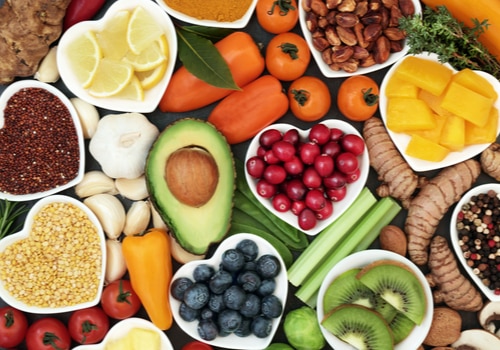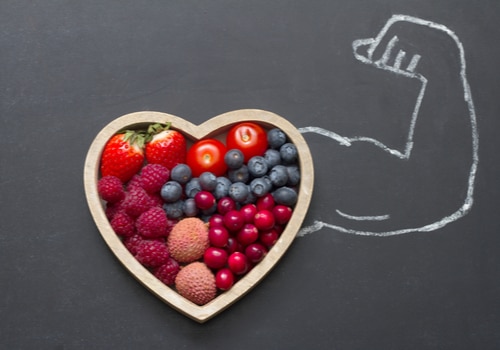15% off £30 OR 20% off £40
6 amazing cranberry benefits

It turns out these little red berries have more to offer than a tangy side for your Christmas lunch. Here, we discuss cranberry benefits and give you six good reasons to add them to your diet year-round.
You’ve probably heard rumours that cranberry juice can fast track your recovery from a urinary tract infection. But is it really the secret to good bladder health in women? And could cranberry tablets be a better way to get a dose of the berry’s antioxidant powers? Here, we discuss the myths, the science and some of best ways to add these berries into your routine.
What are cranberries?
Cranberries are small, round, red berries with a very sharp taste. Due to their sour flavour, you probably wouldn’t choose to eat them raw. So, you’re more likely to buy them dried or in juice form. The fruit is generally harvested from late autumn into winter. In the UK, the fresh berries appear in shops from October to December, just in time for making a cranberry sauce accompaniment for a festive turkey dinner.
In terms of their nutrient content, fresh cranberries are mainly made up of water. They contain very little protein or fat and only a small amount of carbohydrates from natural fruit sugars. But what they are abundant in is a variety of vitamins and minerals.1 They’re also a plentiful source of antioxidants.
Summary
- Fresh cranberries have a tart flavour.
- They’re most commonly consumed dried or in juice form.
- The small, red berries are a plentiful source of a range of antioxidants, vitamins and minerals.
What are cranberry tablets?
The fresh berries are often eaten as an ingredient in recipes laden with an overly generous sprinkling of sugar. Not exactly a healthy option.
If you aren’t a fan of the naturally tart flavour of cranberries and also want to avoid adding too much sugar to your diet, how can you get your dose of this berry’s goodness? If this sounds like you, supplements are a great alternative.
Cranberry pills are a concentrated, natural source of cranberry extract. They’re made from berries that have been dried out, ground down, and bound in a tablet or capsule form. You’ll also find some supplements enhanced with other ingredients, such as vitamin C.
Summary
- Cranberry tablets are a concentrated, natural source of cranberry goodness.
- They provide many of the same benefits as the fresh berries, but without the sourness.
- Supplements are available as small tablets and capsules.
What is cranberry juice?
The best cranberry juice is made from fresh berries and is unsweetened. It has a bright, deep red tone and a tangy taste.
Getting your daily dose of cranberry nourishment can be more convenient when it’s in liquid form. Pure cranberry juice contains the same polyphenols, vitamins, and other active ingredients that are found in the fresh berries.
Although the benefits of cranberry juice are not to be sniffed at, it’s important to select your product carefully to avoid drinks made from concentrates and mixes that are loaded with sugar.
To maximise the cranberry benefits you get from a juice, take care to pick a product that’s made solely from the fruit. And by this we mean it’s free from added sugar or other juices, and also isn’t made from concentrate.
Summary
- Juices are a refreshing and convenient way to add cranberries to your diet
- Take care to choose a pure juice, rather than one made from concentrate
- Steer clear of juices containing added sugars
Cranberry juices vs cranberry tablets
Wondering what’s the best way for you to get your cranberry hit? Here we put cranberry tablets and juice head-to-head.
What’s the best source of cranberry benefits for you?
- Both cranberry juice and cranberry tablets contain antioxidant-rich polyphenols
- Cranberry tablets are more concentrated than cranberry juice
- Some juices contain large amounts of sugar or sweeteners
- If you prefer to get nutrients from food, juice is a great way to incorporate cranberries into your diet
- However, if you don’t like the taste of cranberry, tablets can be a more convenient way to get a dose of the berry’s nutrients
Summary
- Juice and supplements both contain cranberry nutrients that could offer health benefits
- There are pros and cons of both sources
- What you choose will largely depend on personal taste preference and convenience
6 cranberry benefits
What is cranberry juice good for and what do cranberry pills do? In simple terms, they’re a way to get a helpful dose of the nutrients that lead to the following cranberry benefits.
1. Urinary tract health
Cranberries contain proanthocyanins.
The natural, antibacterial properties of these compounds may help to reduce the likelihood of infections in the bladder and urinary tract.
Regularly drinking pure cranberry juice or taking cranberry supplements may contribute to the prevention of repeated urinary tract infections (UTIs) in women.2,3
When you contract a UTI, bacteria invade and attach to the lining of the bladder. The proanthocyanins in cranberry products can interfere with bacteria’s ability to adhere to the bladder wall and urinary tract.4


Studies support the use of cranberry to prevent recurring UTIs.5,6 However, currently cranberry hasn’t been tested sufficiently as a UTI treatment. As a result, there isn’t compelling scientific evidence to support that juice or tablets could cure these infections.
In summary, cranberry juice or tablets could help to weaken the attachment of bacteria to the walls of your urinary tract which could prevent an infection. But it’s less likely they will help if you already have a UTI.
2. Antioxidant effect
Like other fruits, cranberries are bursting with vitamin C and fibre.
But there are other more standout cranberry benefits too.
This is down to cranberries being a potent source of phytochemicals. When you drink cranberry juice or take a cranberry pill, you’re getting a rich serving of antioxidants.
These antioxidants help to reduce oxidative stress in the body.7 When your body produces unstable molecules, called free radicals, this can cause oxidative stress. This can contribute to ageing and lead to problems linked with some chronic diseases.8
Rich antioxidant content suggests cranberry products could prevent or slow down damage to cells caused by free radicals.


3. Improved cholesterol
High cholesterol can increase your risk of a heart attack or stroke.
When excess cholesterol builds up in your arteries, it makes it more difficult for blood to flow freely around your body.
Individuals who regularly drink cranberry juice have lower instances of ‘bad’ LDL cholesterol, and higher instances of ‘good’ HDL cholesterol.9 LDL cholesterol has the potential to build up and clog arteries, so keeping it under control has benefits to heart health.
In brief, a regular intake of cranberry goodness could have a favourable effect on your cholesterol profile.


4. Fewer tooth cavities
The nutrients in deeply coloured berries, such as cranberries, could help reduce tooth decay, plaque and gum disease. (10)
The polyphenols found in cranberries supports dental health by fending off harmful bacteria in the mouth, stopping them from binding to the teeth and gums.11 This protects teeth against bacteria responsible for accelerating tooth decay.


5. Fights colds and flu
Like other berries, cranberries are rich in vitamin C – a nutrient that’s well-known for supporting immunity. (12)
As a result, a regular dose of cranberry goodness could help to reduce the number of colds and other bugs that you pick up throughout the year.
In fact, studies show that cranberry consumption is connected with less severe cold and flu symptoms.13
Overall, we all need a regular dose of vitamin C to keep our immune system in good working order and cranberry is a great source.


6. Cranberry for weight loss
A pure, unsweetened cranberry juice is very low in calories and naturally low in sugars.
This has benefits if you’re following a calorie-controlled diet for weight loss.
Cranberries are also rich in polyphenols. This beneficial micronutrient is responsible for the deep colour in plant-derived food like cranberries, turmeric, and sweet potato. Studies suggest that polyphenols can support weight loss by increasing metabolism.14


Summary
- Cranberry has a long association with managing UTIs.
- However, there are other cranberry benefits for health that are less widely known.
- From supporting heart health to aiding weight loss and preventing tooth decay, there are many reasons to add a source of cranberry to your routine.
Potential side effects of cranberry tablets
You may be wondering, “is it ok to take cranberry pills every day?” The vast majority of people experience no problems when taking cranberry tablets. However, there have been instances of people suffering from stomach aches, abdominal pain, and increased frequency of urination.15,16,17
People with a history of kidney stones might want to avoid cranberry tablets, as emerging science suggests cranberry tablets can increase the risk of more stones developing.18
Those on blood thinners should also avoid cranberry juice, as it may negatively impact the efficacy of the medication.19
Summary
- Most people won’t get side effects from cranberry juices and supplements
- Abdominal discomfort and more frequent urination are sometimes experienced
- Please talk to your doctor if you have a history of kidney stones or take blood thinning medication
Cranberry benefits: It’s not all about UTIs
There’s definitely reason to believe drinking cranberry juice or taking a supplement could help to prevent recurring urinary tract infections in women. However, it’s less likely that cranberry will help treat an existing infection.
UTIs aside, there are also a number of lesser-known cranberry benefits, including reducing tooth cavities, improving cholesterol profile and helping with weight management.
Whether you choose a cranberry pill or a juice is largely down to your personal preference. However, if you have any existing medical concerns, please talk to your doctor about whether it’s suitable for you and dosage.
Last updated: 11 March 2021
- https://www.bbcgoodfood.com/howto/guide/health-benefits-cranberries-and-cranberry-juice
- https://pubmed.ncbi.nlm.nih.gov/11431298/
- https://pubmed.ncbi.nlm.nih.gov/25882919/
- https://pubmed.ncbi.nlm.nih.gov/30520372/
- https://pubmed.ncbi.nlm.nih.gov/11431298/
- https://pubmed.ncbi.nlm.nih.gov/25882919/
- https://www.tandfonline.com/doi/full/10.1080/10942912.2017.1409758
- https://www.ncbi.nlm.nih.gov/pmc/articles/PMC5927356/
- https://www.ncbi.nlm.nih.gov/pmc/articles/PMC3504986/
- https://www.dentalhealth.org/news/cranberries-and-blueberries-why-certain-fruit-extracts-could-provide-the-key-to-fighting-tooth-decay
- https://pubmed.ncbi.nlm.nih.gov/18663617/
- https://www.hollandandbarrett.com/the-health-hub/vitamins-and-supplements/vitamins/vitamin-c/health-benefits-of-vitamin-c/
- https://pubmed.ncbi.nlm.nih.gov/24330619/
- https://www.ncbi.nlm.nih.gov/pmc/articles/PMC3257683/
- https://pubmed.ncbi.nlm.nih.gov/15156934/
- https://pubmed.ncbi.nlm.nih.gov/19042940/
- https://pubmed.ncbi.nlm.nih.gov/17381122/
- https://pubmed.ncbi.nlm.nih.gov/11164137/
- https://pubmed.ncbi.nlm.nih.gov/18516070/















